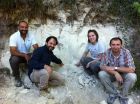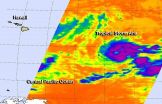Teens' science interest linked with knowledge, but only in wealthier nations
2014-10-15
(Press-News.org) It seems logical that a student who is interested in science as an academic subject would also know a lot about science, but new findings show that this link depends on the overall wealth of the country that the teen calls home. The research suggests that individual science achievement may be influenced as much by broad national-level resources as it is by personal interest and motivation.
This is a photo of students in a chemistry class."Our results suggest that children with high levels of interest in science are able to turn their scientific interest into actual science knowledge to a greater extent when raised in more fortunate socioeconomic circumstances," says psychological scientist Elliot Tucker-Drob of the University of Texas at Austin, lead researcher on the study. "The take home message of this research is that the joint effect of socioeconomic resources and academic interest is more than the sum of its parts."
The findings are published in Psychological Science, a journal of the Association for Psychological Science.
Tucker-Drob and co-authors Amanda Cheung and Daniel Briley wanted to understand the factors that lead to achievement in scientific disciplines, seeking to examine the joint impact of two factors — academic interest and socioeconomic status — that are often looked at independent of each other.
The researchers hypothesized that students living in wealthy nations would have more opportunity to "select, evoke, and attend to science-relevant learning experiences" that facilitate their interest in science. Students who live in poorer nations, however, would have far fewer avenues by which to develop their scientific interest and learning.
Tucker-Drob and colleagues examined data taken from the Programme for International Assessment (PISA), an ongoing international data collection project run by the Organisation for Economic Cooperation and Development (OECD). For PISA, a new international sample of 15-year-olds is assessed every 3 years on reading, mathematics, and science skills.
Looking at the data collected in 2006, the researchers found that resources mattered, at all levels, for predicting science achievement.
Students' science interest was more strongly linked to actual science achievement when they came from home and school environments that were rich in resources. But this was also true when they came from countries that were economically more prosperous (with higher gross domestic product).
The researchers found that science interest and science knowledge were not related at all for students from poor countries.
"In the context of poor family, school, and national socioeconomic conditions, student interest in science is unrelated to science achievement," says Tucker-Drob. "This indicates that there may be a tremendous amount of untapped talent in the population, which is particularly concerning given national emphases on increasing the number of students of science and technology."
While further research will be needed to establish causal links between science interest, national GDP, and science achievement, the findings are important because they highlight the considerable variation in psychological effects that can be seen across different populations.
"[T]he current results add to the growing body of evidence indicating that substantial heterogeneity in psychological effect sizes is not simply a logical possibility but in many cases an empirical reality," the researchers conclude.
INFORMATION:
The Population Research Center is supported by National Institutes of Health (NIH) Grant R24HD042849. D. A. Briley was supported by NIH Grant T32HD007081.
For more information about this study, please contact: Elliot Tucker-Drob at tuckerdrob@utexas.edu.
The article abstract is available online: http://pss.sagepub.com/content/early/2014/10/07/0956797614548726.abstract
The APS journal Psychological Science is the highest ranked empirical journal in psychology. For a copy of the article "Gross Domestic Product, Science Interest, and Science Achievement: A Person × Nation Interaction" and access to other Psychological Science research findings, please contact Anna Mikulak at 202-293-9300 or amikulak@psychologicalscience.org.
ELSE PRESS RELEASES FROM THIS DATE:
2014-10-15
A new study, published online in the journal Age and Ageing today, shows that the homebound status of adults over the age of 65 in the aftermath of the 2011 Great East Japan Earthquake is still a serious public health concern. Of 2,327 older adults surveyed, approximately 20% were found to be homebound.
A team of researchers led by Naoki Kondo of the University of Tokyo's School of Public Health studied data from the city of Rikuzentakata, an area that was seriously damaged by the disaster. Of its total population of 23,302 before the events of 2011, 1,773 people died ...
2014-10-14
New Rochelle, October 14, 2014 –Big Data analytics are helping to provide answers to many complex problems in science and society, but they have not contributed to a better understanding climate science, despite an abundance of climate data. When it comes to analyzing the climate system, Big Data methods alone are not enough and sound scientific theory must guide data modeling techniques and results interpretation, according to an insightful article in Big Data, the highly innovative, peer-reviewed journal from Mary Ann Liebert, Inc., publishers. The article is available ...
2014-10-14
ATHENS, Ohio (Oct. 14, 2014)—It's been millions of years since T. rex took its last breath, but a team led by Ohio University scientists is breathing life back into dinosaurs using high-powered computer simulations to model airflow through dinosaur snouts. The research has important implications for how dinosaurs used their noses to not only breathe but to enhance the sense of smell and cool their brains.
"Dinosaurs were pretty 'nosy' animals," said Ohio University doctoral student Jason Bourke, lead author of the new study published today in the Anatomical Record. ...
2014-10-14
In 2012, the "Mars One" project, led by a Dutch nonprofit, announced plans to establish the first human colony on the Red Planet by 2025. The mission would initially send four astronauts on a one-way trip to Mars, where they would spend the rest of their lives building the first permanent human settlement.
It's a bold vision — particularly since Mars One claims that the entire mission can be built upon technologies that already exist. As its website states, establishing humans on Mars would be "the next giant leap for mankind."
But engineers at MIT say the project ...
2014-10-14
This week, an international team of researchers, led by the Chinese Academy of Agricultural Sciences in Beijing, published in the journal Nature Genetics a brief genomic history of tomato breeding, based on sequencing of 360 varieties of the tomato plant.
The C.M. Rick Tomato Genetics Resource Center at UC Davis played an important role in this study by providing seed of both cultivated tomato varieties and related wild species.
This study, which builds on the first tomato genome sequence completed just two years ago, shows in great detail how the processes of early ...
2014-10-14
Researchers at Ludwig-Maximilians-Universitaet (LMU) in Munich have chemically modified an anti-diabetic agent so as to make its action dependent on light. The resulting prototype compound, termed JB253, induces release of insulin only when pancreas cells are exposed to blue light.
Synthetic, light-sensitive, molecular switches can be utilized to control biochemical signaling processes in living cells. In a new study, a research team led by LMU Professor Dirk Trauner (Chemical Biology and Genetics) and his colleague Johannes Broichhagen, in collaboration with Prof. Guy ...
2014-10-14
Imagine the world waking up one morning to discover that all compasses pointed south instead of north.
It's not as bizarre as it sounds. Earth's magnetic field has flipped – though not overnight – many times throughout the planet's history. Its dipole magnetic field, like that of a bar magnet, remains about the same intensity for thousands to millions of years, but for incompletely known reasons it occasionally weakens and, presumably over a few thousand years, reverses direction.
Now, a new study by a team of scientists from Italy, France, Columbia University ...
2014-10-14
ITHACA, N.Y. – Scientists have sequenced the house fly genome for the first time, revealing robust immune genes, as one might expect from an insect that thrives in pathogen-rich dung piles and garbage heaps.
The research, published Oct. 14 in the journal Genome Biology, will increase understanding of house fly genetics and biology and of how flies quickly adapt to resist insecticides, which could lead to novel control methods.
Adult house flies (Musca domestica) carry and transmit more than 100 human and animal diseases, including salmonellosis, anthrax, typhoid ...
2014-10-14
NASA's Aqua satellite passed over Tropical Storm Ana on Monday, Oct. 13 after it formed in the Central Pacific Ocean.
Ana formed on Oct. 13 at 5 p.m. EDT (11 a.m. HST) as Tropical Depression 2-C, about 920 miles (1,480 km) east-southeast of Hilo, Hawaii. By 9 p.m. EDT that day, the depression had strengthened into Tropical Depression Ana.
NASA's Aqua satellite passed over Tropical Storm Ana on Monday, Oct. 13 at 11:11 UTC (7:11 a.m. EDT) and the Atmospheric Infrared Sounder or AIRS instrument gathered infrared data that showed some strong thunderstorms and cold cloud ...
2014-10-14
WASHINGTON, DC— The 1934 drought was by far the most intense and far-reaching drought of the last 1,000 years in North America, and was caused in part by an atmospheric phenomenon that may have also led to the current drought in California, according to a new study.
New research finds that the extent of the 1934 drought was approximately seven times larger than droughts of comparable intensity that struck North America between 1000 A.D. and 2005, and nearly 30 percent worse than the next most severe drought that struck the continent in 1580.
"We noticed that ...
LAST 30 PRESS RELEASES:
[Press-News.org] Teens' science interest linked with knowledge, but only in wealthier nations



